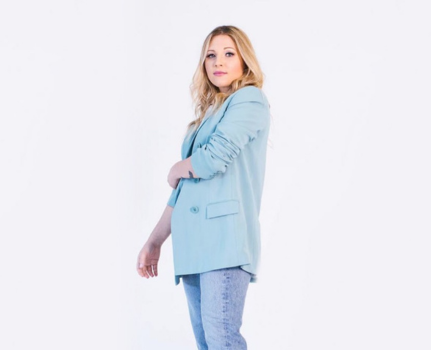
When it comes to PCOS, we have a long way to go.
In particular, expanding conversations to include non-binary and trans folk, raising money for more research and attention on this topic, and promoting accurate, accessible educational resources are all critical junctures that need to be addressed as we move forward. Artist and songwriter, ROZES, is particularly passionate about issues of ongoing care, inclusivity, and healthcare access, and after years of misdiagnoses, plans to be a voice of positive change and hope within the PCOS community. We sat down with ROZES to discuss her journey with PCOS and what advice has best helped her up to this point.
Great to meat you, ROZES! Tell us a bit about yourself.
Hi! My name is ROZES, and I’m an artist and songwriter.
What has your journey with PCOS looked like so far?
I was diagnosed with PCOS last year, but it was a long process of seeking treatment for repeated kidney infections and UTIs. Now I know that my pain was mostly caused by rupturing cysts, but it took me months to get answers to my questions as to what the root problem was. For the most part, I feel frustrated that I was mistreated for so long.
What change do you hope to bring or see in the PCOS community?
On a personal level, I hope to bring awareness. There is so little known about PCOS, and the information that is out there regarding treatment mostly has to do with fertility. But I think: what about people who have PCOS post-pregnancy? What about people who don’t want children? We also have very limited insight as to what PCOS looks like with age, so I believe we need to raise the bar when it comes to treatment options for managing PCOS, without falling back exclusively on the typical ‘lose weight’ or ‘go on birth control’ options, because they’re not right for everyone.
I also want to bring more inclusivity to the PCOS community. Cisgender women aren’t the only ones suffering; we also have non-binary and trans community members being overlooked because they don’t fit the ‘mould’ we are used to seeing. But they deserve to be seen and feel heard and supported too. With all that said, by raising awareness on these topics, we can also raise interest in funding and research that goes toward answering these important questions.
Do you have any advice for women struggling with PCOS?
Yes – for people with PCOS, I would say: never stop advocating for yourself. Never stop educating yourself. If you have questions, go ahead and ask them. You have a right to know what is going on in your own body and to prioritize your own wellbeing and health, without feeling ashamed or pushy. Being informed is critical to being able to advocate for yourself and make the right decisions for you.
Finally – know you did not cause your PCOS.










